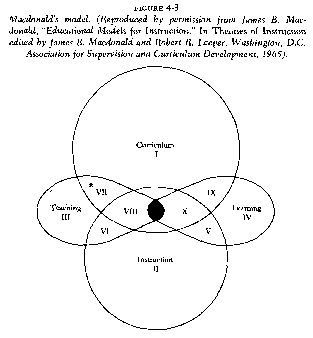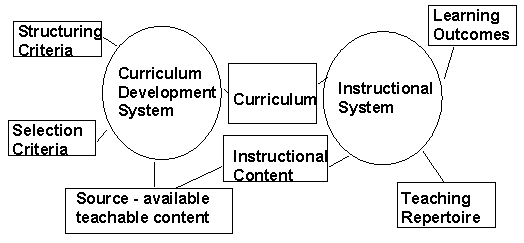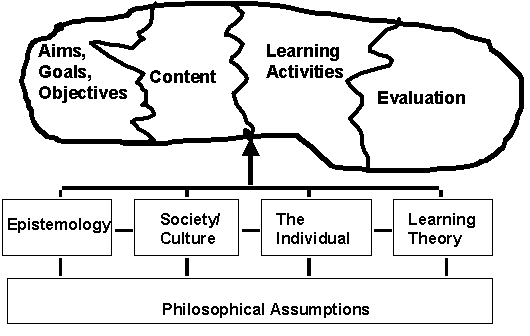NOTETAKING GUIDES: CURRICULUM THEORY
What is a Theory?
- A system of beliefs which guide or control actions.
Deriving a Curriculum Theory
- Theory furnishes those working with a particular realm of knowledge with a way of viewing the world and how it works.
- Theory provides a foundation for action -- shapes individual thinking along certain lines.
Does theory represent an absence of sound knowledge?
- No!
- A theoretical framework is essential for the rational, orderly, and productive conduct of the curriculum enterprise.
- Not all answers are known of what to teach or how it should be taught.
Why have people developed theories?
- To guide study and aid in making predictions?
- Did Christopher Columbus have a theory?
- Do you have theories of how best to instruct? Or on raising a family, or living the good life?
Kerlinger's Definition of Curriculum Theory
- A set of interrelated concepts and propositions that . . .
- Presents a systematic view . . .
- Of a phenomena (situation) . . .
- By specifying relationships among variables (components) . . .
- With the purpose of explaining and predicting the phenomena (situation).
Substance of a Theory
- Provides a logically unified framework,
- Provides generality, and
- Provides an empirical (experimentally observed) basis.
Are theories of doctors and engineers more complex than those of educators or craftsmen?
Derivation of Curriculum Theory
- George Beauchamp - Curriculum theories are derived from -
- Humanities
- Natural Sciences
- Social Sciences
- Beauchamp described -
- Design Theories (models for curriculum design)
- Engineering Theories (models for curriculum development)
What is "Isness" and "Oughtness"?
- Theories for "Oughtness"
- Theories of "Isness"
Function of Theories
Theories describe, predict, and explain phenomena, and they guide the practice of those who use them.
- Description
- Prediction
- Explanation
Curriculum Theory is not Scientific?
- We should not feel "unscientific" when we acknowledge and advocate the value dimension of theory.
Sources of Curriculum Theory
- Curriculum theory draws heavily from our philosophical beliefs -- our understanding of knowledge and our understanding of the world.
- Curriculum development work is greatly influenced by the values we bring to the curriculum development process.
Classic Bases for Curriculum Theory
- Scientific Theory
- General facts, laws, or hypotheses related to each other derived by purely logico-mathematical procedures or a larger set of empirical laws. These unify subject matter.
- Philosophical or Humanistic Theory
- Based on values. Indicates what should or should not be included or done in action. Integrates the intellectual with the emotional and physical.
Functions of Theory
- Descriptive
- Predictive
- Explanation
- Guidance
Summary - Curriculum Theory
- We use theories in our daily lives for direction.
- They aid us in making decisions, i.e., family, finance, etc.
- Theories guide thought.
- They provide a basis for reasoned inquiry in practice.
Curriculum Theory
- Meaning - A set of interrelated concepts, definitions, and statements that presents a systematic view of a phenomena by specifying relations among components with the purposes of explaining phenomena.
Curriculum Theory
- Characteristics - Provides (1) a unified framework, (2) generality, and (3) an empirical basis (experimentally observable).
Curriculum Theory
- Function - (1) describe, (2) predict, and (3) explain.
Curriculum Theory
- Result - Guide to those who subscribe to the theory.
Explaining Curriculum Theory
- Textbook Example to Interpret Curriculum Theory
- Define the Topic
- Where is the Content Being Derived
- Rationale for the Contents and Structure
- Explanation of Structure
- Aim of the Book
- Goals for the Book
Curriculum Models
- Models suggest a representation of certain of a theory.
- They aid in bring a theory to reality.
Models
- Used to turn theory into practice.
- They reduce the bewildering complexity of theories by limiting our scope to practice features.
- Can be used as tools with which to think about curriculum, thus stimulating research and the formulation of new theoretical concepts.
Sample Models - MacDonald

Sample Model - Johnson

Sample Model - Zais

Sample Model - Taba
- Diagnosing Needs
- Formulating Objective
- Selecting Content
- Organizing Content
- Selecting Learning Experiences
- Organizing Learning Experiences
- Evaluating
- Checking for Balance and Sequence
Curriculum Model Summary
- Meaning - A plan of action that can be employed to structure a subject or knowledge area from a theory into practice.
Curriculum Model Summary
- Characteristics - Summarize and explain limited areas of a total theory.
Curriculum Model Summary
- Function - Used as tools to think about a curriculum.
Curriculum Model Summary
- Result - Transition from theory into a curriculum document.
Sample Model - Ritz
- Curriculum Foundations
- Curriculum Content
- Curriculum Evaluation
Curriculum Foundations
- Definition of Program Area
- Rationale for the Study of the Program Area
- Content Source
- Content Structure
- Program Aim
- Program Goals
Curriculum Foundations Definition of Program Area
- An explicit definition of the subject that the curriculum will developed.
- Defines topic; does not say how long, or other things;
- Production Technology - The application of knowledge and production systems used to convert resources into structures and industrial or consumer goods.
Rationale for the Study of the Program Area
- A written narrative explaining "why" it is important to teach this course.
- Outline points and then develop the narrative.
- i.e., Gain an understanding of contemporary industry,
- Develop techniques in problem solving,
- Know technologies that are being used in business and industry, etc.
Content Source
- Philosophical focus about where knowledge for the curriculum is derived.
- Job skills
- Technological society
- Industrial processes
- Citizenship
- Leisure activities
Content Structure
- Display of how the content derived from the knowledge base, content source, will be structure to develop the curriculum.
- A graphic representation.
- Usually show how the main units, or topics, develops to form the curriculum.
Program Aim
- Describes the expected outcome of having studied the content prescribed through the curriculum.
- Assist . . .
Program Goals
- Long range outcomes that reflect the direction in which the curriculum should work.
Textbook Examples a Curriculum Model
- Objectives
- Key Terms
- Content
- Side Bars
- Study Questions
- Student Activities
- Constructional Activities
Other Model Components
- Curriculum Content
- Curriculum Evaluation
- Other Models
Curriculum Models
- Assist with the curriculum development process.
- They provide structure to assist you in undertaking the the curriculum design work.